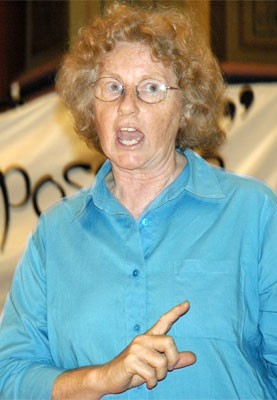Jo Vallentine on opposing uranium mining and U.S. militarism, and the politics of making a difference
Listen Now Download the show by right-clicking the link.
Former Australian Senator and social justice activist Jo Vallentine joins Dr. Caldicott to discuss the rejuvenated uranium mining industry in Australia, which Vallentine is fighting. She has been arrested several times doing civil diso-bedience, most recently for opposing U.S./Australian military exercises involving nuclear-armed warships. Vallentine also reflects on her career in Australian politics and the experiences that led her to fight for social justice causes, including an inspirational trip to America in her formative years. Vallentine was elected to the Australian Senate in 1984 as an advocate for nuclear disarmament. Read Vallentine’s August 5 submission to the South Australian Government, There should be no expansion of Olympic Dam uranium mine.

Jo Vallentine
In explaining her commitment to social change, Vallentine discusses her college years when she spent a year in the U.S. on a scholarship, during which time she was able to hear a rousing speech by Robert F. Kennedy. In the early 1970’s, Vallentine’s lifelong concern about nuclear weapons began as she became concerned about children and their future, both as a schoolteacher and as a mother-to-be.
In the process of asking Vallentine why there is such an intense interest in uranium mining now when Australia has a more progressive government,
Dr. Caldicott wonders how politicians who support uranium mining and nuclear weapons can become separated from the horrific dangers of nuclear materials, and can still call themselves Christians. Listen to Dr. Caldicott’s recent interview with Dave Sweeney for more on uranium mining and its global implications. Also visit the websites of People for a Nuclear-Free Australia, ANAWA (Antinuclear Alliance of Western Australia), Australian Conservation Foundation, Roxstop, and Friends of the Earth Australia.
Vallentine was elected to the Australian Senate three times, first on the issue of nuclear disarmament and later on a full Green-Party agenda. She explains how she became the candidate for the history-making Nuclear Disarmament Party, and was initially elected to the Senate at age 39. She says she was completely on her own in Canberra in terms of the progressive stances she would take on opposing nuclear weapons. There was intense media interest in her as a former teacher and mother of two young girls. Vallentine was deeply unsettled by then-President Ronald Reagan joking about using nuclear weapons as his administration greatly expanded the U.S. nuclear arsenal. She worked hard to put disarmament on the Australian government agenda, despite constant criticism from then-Prime Minister Bob Hawke, an ally of Reagan. She says she “got in trouble for asking too many questions.”
Vallentine and Dr. Caldicott talk about the U.S. base in Pine Gap, Australia, what Dr. Caldicott calls “the mid-brain of America’s military system.” Vallentine says that she was denied access to Pine Gap when she was a Senator, and that much about its true importance is kept secret. Dr. Caldicott says Pine Gap is part of a U.S. first-strike nuclear-war-fighting operation. The base presently targets U.S. drones when they bomb Afghanistan and Pakistan by remote control. It is also a key component of a U.S. missile defense system and is aiding America’s weaponization of space, part of the U.S. agenda to dominate and fight wars from space. Several billion dollars of contracts have been awarded to companies like Boeing, Lockheed Martin and Raytheon to put U.S. weapons in space. Listen to Dr. Caldicott’s interview with Craig Eisendrath, Ph.D. about weaponizing space. Dr. Caldicott and Eisendrath wrote the book War in Heaven. Read about the Pine Gap 6 activists arrested for civil disobedience.
Vallentine continues the discussion of U.S. domination of the world. She talks about her experience at the recent Australian protest around the U.S. military exercise involving 20,000 U.S. service personnel and 6,000 Australians. She says Australia has a subservient relationship to the U.S., which operates at least 11 bases in Australia. Read about the global U.S. military presence in the 2008 article StratCom in Context: The Hidden Architecture of U.S. Militarism. Dr. Caldicott says that there is less opposition to U.S. policies and involvement in Australia than in the past, and she partly blames the Australian media led by Rupert Murdoch. The mad rush now to export Australian uranium, she says, is really about exporting cancer, leukemia and genetic disease, and young people in Australia are not educated to understand this reality.
Vallentine says that the nuclear war dangers have been blocked out from people’s consciousness since the ostensible end of the Cold War, and their concern has been transferred to the legitimate danger of global warming. Read Denial in the New Millennium: Nuclear Terror and Psychic Numbing by psychiatrist Carol Wolman, M.D. But she says the public needs to understand the fabrications of the nuclear industry about nuclear power and global warming, and she outlines how greenhouse emissions are produced by eight major stages of making power from uranium. The emphasis in opposing nuclear power should be on how renewables can fully power the future. This theme is covered in depth in a 2007 report Dr. Caldicott commissioned, Carbon-Free and Nuclear-Free: A Roadmap for U.S. Energy Policy by engineer Arjun Makhijani, which can be read on-line. To stand up to the steady propaganda of the nuclear industry, Vallentine says, antinuclear activists must be very specific about why nuclear power is totally contraindicated. Read Dr. Caldicott’s 2006 book about nuclear energy and climate change, Nuclear Power is Not the Answer and see the article The U.S. Press: The Top Ten Nuclear Lies.
